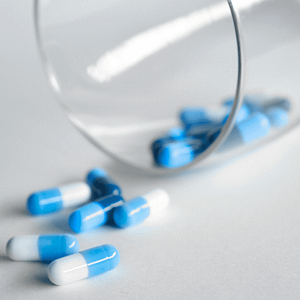If you or someone you know is dealing with alcohol use disorder or opioid use disorder, you may have come across information about treatment options involving naltrexone. Reports about the effectiveness of naltrexone medication for treating these disorders have been positive, leading you to consider it as a potential solution to your substance use issues. In this discussion, we will thoroughly explore this topic so that you can make an informed decision about whether naltrexone is a suitable option for your situation.
What Is Naltrexone?
Naltrexone is a medication that the Federal Drug Administration approved to treat opioid use disorder and alcohol use disorder. People often take opioids to feel the euphoric effects that the drug produces, but naltrexone blocks these effects so that the user cannot experience them. By binding to opioid receptors and blocking them, naltrexone also helps to reduce cravings. It is considered a safe option for individuals with opioid use disorder because it does not have addictive properties.
You have the option of taking naltrexone in pill form. The dose is 50 milligrams each day, but you may also take an injection of naltrexone, which is an extended-release form. In this case, you would receive a 380-mg injection into your muscle every month. Lastly, you may be able to receive implantable pellets, and they are another extended-release option.
Benefits of Naltrexone Therapy 
Naltrexone treats people with opioid use disorder or alcohol use disorder, but it is for a segment of the population who has been through a detox program and is in treatment to help them move forward on their journeys to sobriety. Naltrexone assists them in continuing to abstain from opioids or alcohol by eliminating cravings for their drugs of choice and blocking the effects of drugs or alcohol while they are recovering. It is instrumental in helping people remain sober in the long term.
Therapists include naltrexone in the treatment plans they develop for their clients with opioid use or alcohol use disorder. Along with the medication that gives them the positive benefits described above, these clients also receive counseling in their treatment programs. They may also participate in behavioral therapies that treat substance use disorders.
Potential Side Effects of Naltrexone
You may experience side effects while taking naltrexone. Naltrexone side effects include the following:
- Rash
- Joint or muscle pain
- Drowsiness
- An increase or decrease in energy levels
- Trouble falling asleep or staying asleep
- Fearfulness
- Irritability
- Nervousness
- Anxiety
- Dizziness
- Headache
- Loss of appetite
- Constipation
- Diarrhea
- Stomach cramping or pain
- Vomiting
- Nausea
If any of the above symptoms are very severe or they do not seem to be going away, you must inform your physician.
The following naltrexone side effects are serious, so you should not wait to inform your doctor if you experience them:
- Severe vomiting with or without diarrhea
- Blurry vision
- Visual or auditory hallucinations
- Confusion
You must stop taking naltrexone if you experience the following naltrexone side effects:
- Jaundice of the eyes or skin
- Dark urine
- Light-colored bowel movements
- Pain in the upper portion of the stomach that lasts longer than a couple of days
- Loss of appetite
- Unusual bruising or bleeding
- Excessive tiredness
You must report the naltrexone side effects listed above to your physician immediately upon experiencing them.
Is Naltrexone Right for Me?
You or your loved one may be recommended for naltrexone treatment if alcohol dependence is moderate to severe. Criteria for being a good candidate for naltrexone include drinking alcohol on more than 50% of days in the year, consuming more than five drinks daily, experiencing alcohol-related issues, and having a history of unsuccessfully attempting to quit drinking. If you tried to quit drinking in the past and failed but are highly motivated to succeed in reducing or stopping your consumption of alcohol, considering naltrexone treatment would be an excellent plan for you.
Your physician will require you to abstain from alcohol before you can begin treatment with naltrexone. If you can abstain for several days before your treatment starts, this will indicate that you are motivated enough to begin treatment with naltrexone.
Should I Take Naltrexone?
Before you ask this question, you must consider the following. Naltrexone may or may not be appropriate for you even if you fit the description above. Before you commit to naltrexone therapy, discuss this issue with your doctor first. Naltrexone therapy may be the perfect solution for you, or your doctor may have an option that may be better.
The Effectiveness of Naltrexone
Naltrexone is an effective treatment for alcohol use disorder. It is also prescribed to prevent relapse in people who have completed an opioid detoxification program. To obtain the greatest effects, the person must be involved in a comprehensive management program that provides the person with additional support. Research studies conducted on naltrexone demonstrated that it is effective for the treatment of alcohol use disorder if people also receive counseling and psychosocial support.
Success Stories From Those Who Used Naltrexone
Many reviews posted on WebMD demonstrate the effectiveness of naltrexone for treating alcohol or opioid use disorders. For example, one person stated that he drank heavily every day for the past 12 years, but he “desperately wanted to quit.” After beginning treatment with naltrexone, he needed less than 24 hours to make a positive difference. He took the first pill in the middle of having a drink, and it stopped his desire to continue drinking within 30 minutes. He doesn’t even have any cravings.
Another user has been taking naltrexone for one month. During that time, he didn’t have the desire to drink any alcohol. Unlike the first testimonial, this user has experienced some cravings, but he stated that they were decreasing in severity. This former drinker used to consume one or two bottles of wine daily for the past 10+ years. He is experiencing a few minor side effects, such as ringing in the ears, low libido, and foods tasting different, but he isn’t experiencing as much depression. He stated that he is less emotional but experiences anxiety at times. He believes that naltrexone must be a miracle because he has not had one drink since taking it, and he was at an extremely high level of consumption.
This last person was wary of taking naltrexone, but he is glad that he decided to do it. He states that he has had an alcohol use disorder for most of his life, but when he is taking naltrexone, he can reduce his consumption to a normal level. He also states that the cravings he experiences are relatively minor. He gives naltrexone the credit for being able to work in a career he loves and giving him the ability to improve his life.
Most of the reviews for naltrexone were excellent, but there were a few lower reviews. For effectiveness, 81 people gave it five-star reviews while 32 people gave it one-star reviews. Also, 11 people gave it two-star reviews, 23 people gave it three-star reviews, and 28 people gave it four-star reviews. The majority of reviewers were happy with the results they received from this drug, so it may be worth a try for you as well.
Treatment Considerations and Options
You may receive naltrexone at Granite Recovery Centers. Your therapist will prescribe the dose that you will need to treat your alcohol use or opioid use disorder. This may be one tablet each day, one tablet every other day, one tablet every three days, or one tablet a day except Sunday.
Naltrexone cannot help you if you do not take part in the therapy sessions that you receive in the treatment options you have at Granite Recovery Centers. The first step in your treatment for your alcohol or opioid use disorder would be to complete the detoxification program. Then, you may enter the inpatient addiction treatment program, where you will receive counseling, group sessions, and education programs.
If you receive naltrexone medication for addiction, you must not take either prescribed or illicit opioid drugs. If you were to take these drugs at low doses, the naltrexone would prevent you from feeling the effects. If you were to ingest opioid drugs at high doses while on naltrexone, you would be in danger of experiencing a serious injury or falling into a coma. You might even die.
The Benefits of Personalized Treatment Plans
You are not like anyone else in the world. Each person is different, so drug and alcohol treatment centers must treat each addiction with a personalized treatment plan. For example, your personal history, social factors, and co-occurring mental health conditions play a role in the reason that you became addicted to alcohol or opioids. These differences require personalized treatments, so that is why we will get to know you and your history before we develop your treatment plan at Granite Recovery Centers. This ensures that our therapists address all of your issues in your therapy sessions and make sure that we can heal you in every way.
The Role of Naltrexone in Achieving Lasting Sobriety
Naltrexone is a medication that is highly advantageous to those experiencing alcohol use or opioid use disorders. It is instrumental in keeping you on your way to sobriety after you complete the detoxification process. Because you are taking naltrexone, you are less likely to relapse and return to substance use.
Although naltrexone treatment options give you hope that you will be able to stop your use of alcohol or opioids sooner rather than later, it is a medication that does not work for everyone. You must gather as much information as you can from professionals before you will be able to begin naltrexone for addiction treatment.
You will find the support that you need to select the appropriate naltrexone treatment options. Once you find them, you will be on your way to sobriety with determination.



















